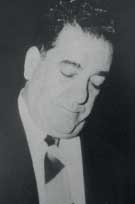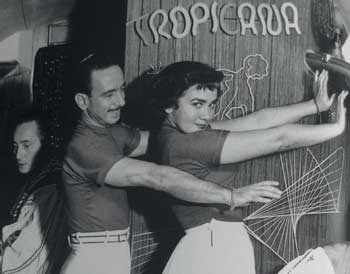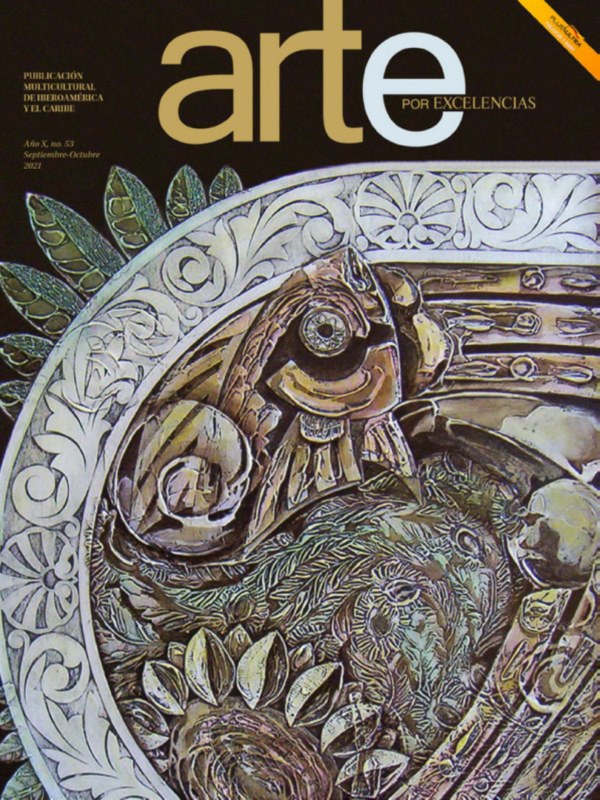Martin, the peasant
 Martin Fox was born in Ciego de Ávila, and since he was very young began his career as a gambler. He mounted a shop window of cigarettes and cigar called La Batallita, located in a corner of the main avenue of the city, opposite to the park, and in which he also secretly engaged in all kinds of illegal gambling. His fellow on these activities was Oscar Echemendía who was engaged in the work of collection, registration, settlement and any task that will result from these illegal businesses.
Martin Fox was born in Ciego de Ávila, and since he was very young began his career as a gambler. He mounted a shop window of cigarettes and cigar called La Batallita, located in a corner of the main avenue of the city, opposite to the park, and in which he also secretly engaged in all kinds of illegal gambling. His fellow on these activities was Oscar Echemendía who was engaged in the work of collection, registration, settlement and any task that will result from these illegal businesses.
Once he moved to Havana and became friend with Alberto Ardura, who was responsible for the control and exchange of currency for jukeboxes that worked at Spa La Concha, which, like the Hippodrome, the Jockey Club, the Grand National Summer Casino and Casino were the only officially licensed establishments in the gambling business, under Resolution, later into law that gave that right to the company known as "the 3-C" (Cespedes, Cortina and Casanovas), having urbanized lands located between the 42nd and the roundabout of Marianao beach.
Martin and Ardura decided to celebrate what they called "a trap" in the house of Ardura, located in a very discreet neighborhood near the old brewery La Tropical, and that was to invite multiple "points" on a given day that they would come from Ciego to celebrate the game. Ardura received good payment for giving his home, and Martin got big profits because their companions had much experience in the fraudulent use of cards and dice.
The points increased and the stay in the same house so often was getting dangerous, so they decide to look for a suitable place and, above all, with the tolerance of the authorities. Despite the lavish spectacles that were offered at Tropicana, the business was not going well because of the economic crisis prevailing in the country, and the distance at that time that separated the cabaret of Havana.
Thus, the first entrepreneur of Tropicana, Victor de Correa, accepts the proposal of Martin of renting the upper floors of the business to mount a lounge prepared for their activities while at the reception hall of the low El Guajiro placed a table to play baccaratt. He also leased the window shop of Ciego de Ávila, brought Echemendía to work with him, and hired Ardura so he would deal with everything related to the "legal" gambling. Nor Martin or any of its members would never sit at a table to play: they had their henchmen, who fully represented their interests.
Time passed, and while Martin increased his profits, Correa continued with poor clientele, which forced him to apply some cash loans to Martin and credit guarantees with suppliers of goods, to ensure the survival of the restaurant.

In time, the debts grew and Martin became a partner of the cabaret, who thus got more freedom for his operations. He finished the contract with Makarov, bought the property in Villa Mina and started operations with the ball at the top of the cabaret. A cafe that existed in the old garage of the residence which was operated by Spanish, also became part of his property, and after making some arrangements, he inaugurated it with the name El Dorado. In it he placed domino tables for entertaining the clients´ drivers and the general public.
The triumph of Grau San Martin in 1944, and his slogans against vice and corruption, dealt a blow to Martin, who had to close the casino and everything related to the gambling. He had to dismiss the entire staff, except his henchmen, and continues as a partner of Correa in the cabaret.
The "traps" started again, though very discreetly and in different houses rented for such purposes. It was a very hard time economically, but El Guajiro had reservations to face it, hoping that would not last long. With the government of Carlos Prio tolerance would begin again. A Tourism Law to "protect" this important economic sector of the country is dictated, and Tropicana reopens the doors of the Casino, this time under total control of Martin, El Guajiro of Ciego.
This government decision begot the known gangsters bands that ravaged the country, including the sorrowfully 'tigers', who tried to hit the cabaret with their blackmail. Martin quickly asked for protection to his members from the high government sphere, and these annoying visits were eliminated.
The number of visitors to the cabaret continued very low and it was unaffordable, but Martin saw his gambling business flourish, and he would not allow the quality of the shows decay. In a time of crisis he requires Correa to sell him his part of the business or buy him his. He strongly refuses, and Martin brings together the leading providers of goods, with whom he had been the guarantor, and informs them that from that moment Correa will act at his own risk.
The situation for Correa was desperate: He had no money and could not find financiers. The day came when there was no merchandise available. Before losing everything, he decides to sell Martin, who through blackmail became the absolute master of Tropicana. He sends for his brother Peter, who worked in the cafeteria at Central Station in New York, and made him responsible with everything related to this branch. Ardura takes over the gambling and shows, and Echemendía remains as general manager of the cabaret and illegal gambling.
Martin controlled the business and divided the profits with their partners, according to their responsibilities and hierarchical order: Echemendía, Ardura --- who from that moment would be known as the man in the white suit for his famous denim suits, and finally his brother Peter. The checks were distributed on December 23 or 24 each year.
A new and definitive stage arises in Tropicana when Victor Correa sold to Martin Fox, El Guajiro of Ciego de Ávila, his participation in the business.
See: The true story of TROPICANA (II). CORREA, a businessman.










